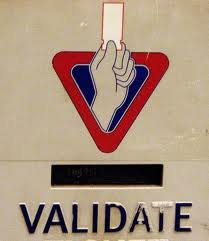Monday, April 09, 2012
We Validate
I just read a blog post about a writer who is answering the question, Why do you want to be published by a traditional publisher? Right off the bat, the writer said, "Validation." She would feel validated because a bunch of supposedly widely read people chose her book to publish. I guess there's no validation in people who actually do read books and are willing to put their hard earned cash on the line to read her book.
It might be true that in days gone by that publishers staffed their houses with people who were widely read and knew something about books and how to value books, but those days are long gone, the widely read editors and staff replaced by MBA from Harvard, Yale, and NYU. It's all about numbers and not so much about good books, as anyone who has read the current crop of best selling authors will tell you. Larded in among the authors who actually know how to write are dpeople who rely on gimmicks to entice the reader and authors who have sold their souls for fame and riches and let their characters languish, writing cookie cutter books where the names and places and jobs have changed, but the characters have not. I want validation of a different sort.
I want the validation that comes with having written a good book, or books, and people plunking down their hard earned cash to buy my book. That is validation. There is no real validation in a business that is all about numbers and branding and less about the quality of the work, at least in my estimation.
My first solo novel was chosen by a publisher and published. My second novel was self-published and I'm prouder of it because people actually want to read and buy and recommend it to other people who buy and read. Yes, I would take a look at the contract if a traditional publisher wanted to pick up my self-published titles, and I might even considering signing it, but I already have my validation. Going with a traditional publisher has to come with a lot more oomph than validation. It would have to come with a great marketing and design package and a lot more money than I can make on my own. I am no longer dazzled by 5- and 6-figure advances because I know what that really means.
Big advances are big loans that have to pay off to continue to get big advances, and they are paid in installments. The money doesn't go to the author right off the bat. The author gets a quarter of the money for signing, a uarter for finished book ready to edit, a quarter on publication, and the rest at some unnamed date, or the advance goes in thirds. Royalties aren't paid until the advance is paid off.
No one tells you that best sellers often are based on inflated numbers. The best seller list numbers come from number of books contracted for sale and not the actual sale of books. Often the books that go out the warehouse door end up in landfills and on remainder tables or come bac to the warehouse dirty and shelf worn because they didn't sell. Yes, consumers can be lemmings, but not always. When an author self publishes and sells tens of thousands or even millions of books, those numbers were actually bought and the books delivered and read.
There is a lot about publishing that still has some value if you believe well read individuals with a track record for excellence have chosen your book, but it's smoke and mirrors. I'm mercenary come to that. I prefer my validation in dollars and cents -- and in people talking about my books and the characters and asking me when the next book is coming out.
Publishing traditionally or self-publishing is about learning the game. Mistakes will be made, but I've learned that being on the upswing is far better validation than being on the down swing.
Subscribe to:
Post Comments (Atom)

No comments:
Post a Comment